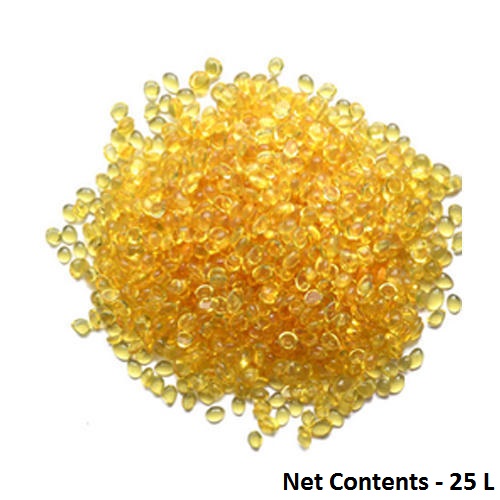
















Model - 220 NA
Form - Spherical Beads
Usage - Removes total hardness from the water
Color - Golden Yellow
Particle Size - 0.3 to 1.2 mm
Pack Size - 25 liter
₹ 3,699We are offering you this product to remove hardness from the water. Water softening is a method in which water runs through a bed of resin to change the hardness ions, calcium, and magnesium, for sodium ions. While the resin has reached its capacity for keeping hardness ions, the water softener begins a regeneration cycle.
Softening by ion exchange resin is also identified as Base Exchange softening. Hard, raw water is passed over a bed of cation resin in sodium form. Ca and Mg ions, which create hardness, are exercised up by resin and in replacing sodium ions are surrendered from the resin. Raw water resumes getting softened till the resin gets drained.
Water softening is an important method because the hardness of the water in residences and companies is reduced through this method.
While water is hard, it can seal pipes and soap will fade in it very easily. Water softening can hold these negative effects.
Hard water originates a greater chance of limescale films in household water systems. It raises the expense of residential water heating by around fifteen to twenty percent. This practice expanding the life span of the household machine and the life span of pipelines. It also provides improved working, and more lengthened the lifespan of solar heating systems, air conditioning units, and many other water-based applications.
Benefits
Uses:-
Features:-
Required fields are marked *
1 Is water softener resin harmful to drinking water?
Ans. No, water softener resin itself does not mix with drinking water. It remains inside the softener tank and only aids in the ion exchange process to eliminate hardness minerals.
2 Can water softener resin contaminate water?
Ans No, if properly maintained, water softener resin does not contaminate water. However, if the resin bed is damaged or worn out, small resin particles might end up in the water, necessitating a replacement.
3 What is the lifespan of water softener resin?
Ans: High-quality resin can last between 10 to 15 years, depending on factors like water quality, maintenance, and the presence of chlorine or iron, which can accelerate resin degradation.
4 Which type of water softener resin is the most effective?
Ans: The most suitable resin depends on your specific needs:
5 Is it safe if resin beads enter my water supply?
Ans: Swallowing a few resin beads is not harmful, but it signals a problem with your system. If you find resin beads in your water, consider replacing the resin or inspecting for a damaged softener screen.
Anubhav (05-Aug-2025)
Good quality softener resin
Sahil (20-May-2024)
Great experience
Himanshu (20-May-2024)
High quality products
Rajat (20-May-2024)
Very impressive and amazing deal go for it